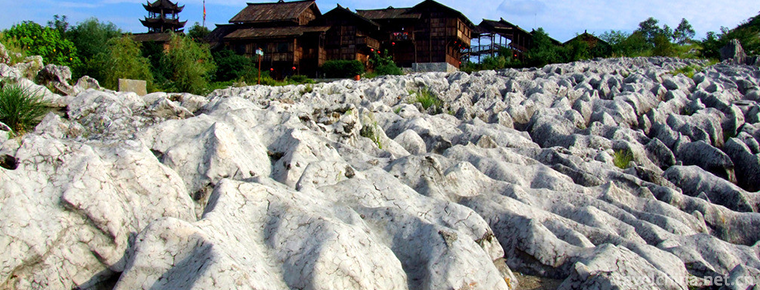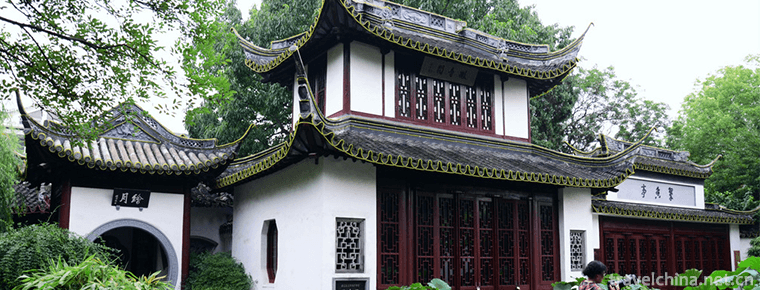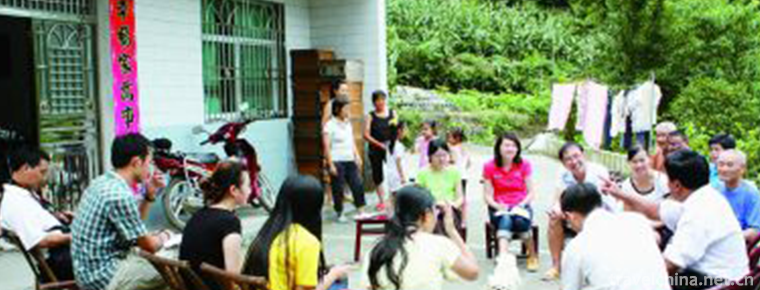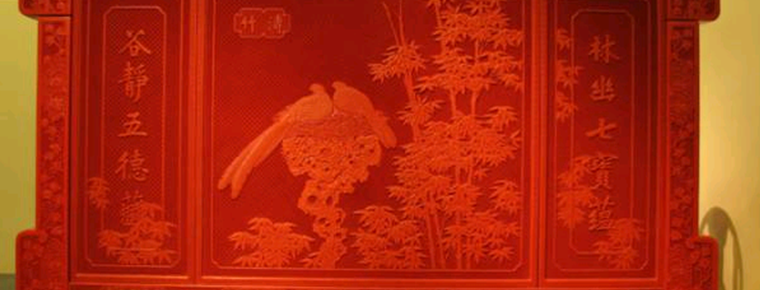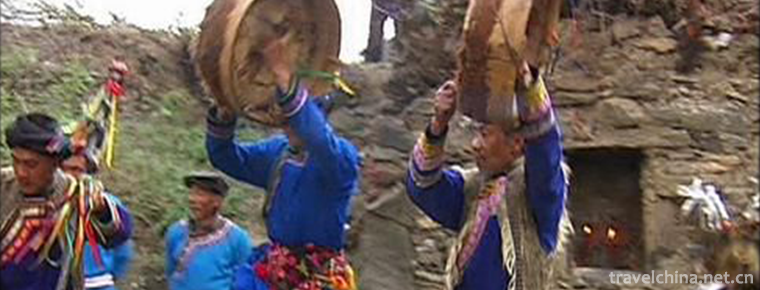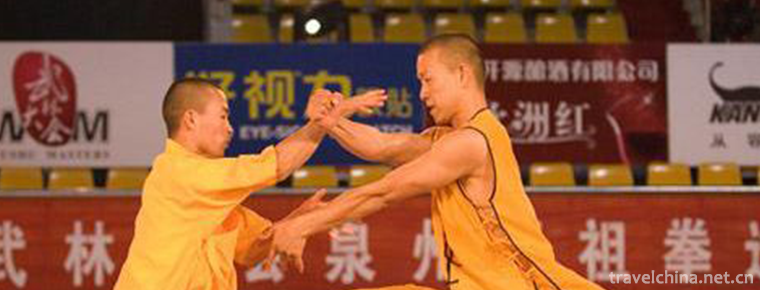Siping Opera
Siping Opera
Siping Opera, also known as Sijuan Opera, Siping Opera, Sipeng Opera and Sipeng Opera, is popular in Pingnan County, Zhenghe County, Fujian Province. It is one of the national intangible cultural heritage.
Siping Opera originated in Pingnan, Ningde and other counties. At the end of Ming Dynasty, Longtan Village in Pingnan was introduced from Jiangxi. After the middle of the Qing Dynasty, the four-year opera in Pingnan entered its heyday. After the Republic of China, the scope of Siping Opera activities narrowed. Siping opera singing Bai maintains the high-pitched tradition of using "Tuguan dialect" and "singing by one person, everyone and". Popular lyrics, free tune, the main voice, this false alternation, with the Song and Yuan Zaju style of performance.
On May 20, 2006, Siping Opera was approved by the State Council to be included in the first batch of national intangible cultural heritage catalogues, numbered IV-11.
historical origin
According to the old artists of Siping Opera in Longtan Village, Xiling Township, Pingnan County, from generation to generation, the peasants of the Siping Opera family in the eastern Fujian area, named Chen Qingying (Yin), learned from Jiangxi at the end of the Ming Dynasty. They passed on from father to son, from son to grandson, from daughter-in-law to daughter-in-law. By 1982, they had passed on for 16 generations, forming a strict set of rules and regulations, and acting as the traditional ancestor of the Chen family in the village, from the elderly to the children.
In the middle of Qing Dynasty, Siping Opera was the most prosperous period. There were only more than 100 families in Longtan Village of Pingnan County, including "Old Xiangyun", "New Xiangyun" and "Sai Xiangyun". The "Lao Xiangyun" class was founded in Jiaqing period of Qing Dynasty (1796-1820), and has a high reputation. It has been performing abroad for many years, as far as Jiangxi and Zhejiang provinces. The Siping Opera Troupe in Yangyuan Village, Zhenghe County, also went out of the county to perform in Zhouning, Shouning and other counties. At the same time, in the early years of Jiaqing, there was a Siping Puppet Troupe spread from Jiangxi to Heyang Village in Zhenghe County. In the seventh year of Guangxu (1881), the class Siping Puppet Troupe developed from Puppet Troupe to Siping troupe. During the period from Qingdaoguang to Guangxu (1821-1908), the Siping Opera of Zhenghe was influenced by random bullets and pihuang tunes, which added Beijing Opera repertoires such as "Blocking Horses", "Playing Dragons and Phoenixes", "Dabu Tan", "Xiaobu Tan" and other tunes such as "Sing Down the River Dance" and "Singing Pihuang Down the Plate". The Siping Opera in Longtan Village of Pingnan is less influenced by other voices, so it retains its original appearance.
After the Revolution of 1911, Fujian Opera and Peking Opera prevailed, and Siping Opera was on the verge of extinction from decline. In the 1980s, there was only a folk professional Siping Opera troupe in Longtan Village, Pingnan County, which performed in remote mountain villages in neighboring counties. According to statistics, there were about 70 performances in 1992.
Another way is popular in Zhangzhou, Pinghe, Zhangpu, Zhao'an, Yunxiao, Nanjing and other places in southern Fujian. According to the old artist Zeng Xianyi, in the late Ming and early Qing Dynasties, many immigrants from Jiangxi moved to Fujian, followed by the introduction of Siping Opera into southern Fujian. Zeng Xianyi's ancestors were the immigrants from Fengxian County in southwestern Jiangxi to Pinghe County in southern Fujian. In the thirteenth year of Qianlong reign of the Qing Dynasty (1748), Cai Bolong, a Zhangpu native, recorded in the article "Playing Music" in the volume of "Explanation of Guanyin Hui": "Do Zhengyin (Zheng) to sing official tune; Do Baizi (Zheng) to sing Quan tune; Do big classes (Zheng) to sing Kun tune; Do Nine Corners (Zheng) to sing Siping; Make Chao tune (Zheng) to sing Chao tune..." It shows that Siping Opera has been popular in southern Fujian in the late Ming and early Qing Dynasties, and its role has evolved from "Seven Children's Band" to "Nine Corners" in the Qianlong Period (1736-1795). Its musical card, traditional repertoire and accompaniment instruments are basically the same as those of Siping Opera in eastern Fujian and Northern Fujian. Cai Botao does not recognize his ex-wife, the seal of the six kingdoms of Su and Qin, Liu Wenlong Ling Huajing and Lu Meng Zhengyi Jin return home. 》 It's called "Four Big Sheds".
After the mid-Qing Dynasty, Siping Opera in South Fujian developed rapidly, and its acting roles developed from "Nine Corners" to "Twelve Corners". At the same time, it absorbed a lot of Musical Singing and performing arts from Kunshan Opera and Pihuang Opera. Especially in the later period, Waijiang Opera, which sang along the North-South Road (Erhuang and Xipi), prevailed. Siping Opera in South Fujian was greatly influenced and began to absorb Pihuang Opera. From the traditional scripts handed down in the late Qing Dynasty, it was found that most of the singing tunes were marked as headboard, second board, inverted board, folding board, allegro, rocking board and "singing Xipi" under the name of the opera cards of Siping Opera. In addition to the representative "four shanty heads", the traditional repertoire adds "four bows and horses" (i.e. Tie Bow Margin","Qianliju","Ma Ling Dao","Zhongyilie") and"five yuan records"(i.e. Man Bed Wa", "Wugui Ji", "Yuehua Garden", "Fan Li Hua", "Luo Pa Ji).
The late Qing Dynasty and the early Republic of China were the most prosperous period of Siping Opera in southern Fujian. Every County in Zhang belongs to the professional class club of Siping Opera. In Zhangzhou and Longxi, there are "Fengyi Class", "Wansheng Class", "Yufeng Class" and "Yongchun Class". In Nanjing, Pinghe, there are "Yongfeng Class", "Ronghua Class", "Xinfu Class", "Caixia Class", "Jinlin FengClass", "Linfeng Class". In Yunxiao and Zhaoan, there are "Wanli Class", "Qingle Class" and "Quanfa Class", performing "Zhongyuan Youjie Street", "Jinhua Class". Reporting Quickly, Drunken Princess, Rongfeng of Five Dynasties, Wutaishan, etc. Pinghe County's Fengyi and Wanli Ban also performed in Longyan, western Fujian. In the 24 years of the Republic of China (1935), Ronghua Ban in Nanjing County was disbanded on the spot after its performance in Longyan. Artists fled to Suxi, Tiaowei, Hongfang, Longmen and other places to teach operas and perform in amateur groups.
In the 1920s, because of the rise of Xiangju Opera and the prevalence of Chaozhou Opera, Siping Opera in southern Fujian declined.
After the 1980s, the "four flat gongs and drums" activities were resumed in rural areas of Pinghe County as instrumental performances during festivals, temple fairs and weddings and funerals.
Distribution area
Siping Opera is popular in Zhenghe and Jianou of northern Fujian, Jiaocheng, Pingnan, Shouning, Fuan, Gutian and Fuzhou of Eastern Fujian, and Zhangpu and Changtai of southern Fujian.
Inheritance and Protection
Inheritance value
Siping Opera preserves the original Yiyang Gaoqiang characteristics, the simple traditional Southern Opera performance style, the elegant and popular combination features of text and performance, and the close relationship with religious folklore. Previously, Chinese theatre experts believed that Siping Opera had disappeared in China and was written into the Dictionary of Chinese Traditional Opera and Art. Unexpectedly, in the early 1980s, it was unexpectedly found in Pingnan County, which caused a stir in the National Theatre circle and was regarded as a living cultural relic of Siping Tune. Especially, a large number of ancient manuscripts of Southern Opera in Song Dynasty and Legendary Opera in Ming and Qing Dynasties are still preserved. In addition, Siping Opera, due to its "misuse of local language" and casual and impromptu "interruption" performances, has preserved a large number of traditional folk oral literature and scientific criticism actions, as well as the study of ancient phonological sounds, ancient vocal singing and martial arts routines, which are rare and lively materials.
Heritage figures
Chen Xiuyu, female, Han nationality, born in 1945, is a native of Longtan Village, Xiling Township, Pingnan County, Fujian Province. In February 2008, Chen Xiuyu was selected as the representative successor of the second batch of national intangible cultural heritage projects and declared in Pingnan County, Fujian Province. In 1958, Chen Xiuyu entered the Siping Opera Troupe in Longtan Village and became one of the first female artists in Siping Opera. She formally learned from the famous old Siping Opera artists Chen Yuanxue, Chen Guanwa and Chen Guanqiu.
Chen Dajun, male, Han nationality, born in 1949, is from Longtan Village, Xiling Township, Pingnan County, Fujian Province. In February 2008, Chen Dacheng was selected as the representative successor of the second batch of national intangible cultural heritage projects and declared in Pingnan County, Fujian Province. Chen Dayong is a backstage actor of Siping Opera. He has nearly 40 years of acting career. He is good at backstage assistant tune, performance and backstage scenery production of Siping Opera.
Zhang Xiaoyou, male, Han nationality, born in 1951, is a native of Yangyuan Village, Yangyuan Township, Zhenghe County, Fujian Province. In February 2008, Zhang Xiaoyou was selected as the representative successor of the second batch of national intangible cultural heritage projects and declared by Zhenghe County, Fujian Province.
Li Zhiqing, male, Han nationality, born in June 1949, is a native of Heyang Village, Yangyuan Township, Zhenghe County, Fujian Province. In February 2008, Li Zhiqing was selected as the representative successor of the second batch of national intangible cultural heritage projects and declared by Zhenghe County, Fujian Province. Li Style Qing began to learn Siping Opera at the age of 12. He was taught by Li Dianggan, a famous student of Siping Opera in Heyang Village, and a student of engineering, culture and martial arts.
protective measures
The people's government of Pingnan County attaches great importance to the protection and development of Siping Opera. In 2002, the Propaganda Department of the county committee established the "Pingnan County Local Opera Research Office", which protects and studies traditional operas such as Siping Opera, and collects and collates a large number of documents. In recent years, a large amount of funds have been invested to restore the "Longtan Siping Drama Troupe" in Chen Yuanxue's hometown and train a large number of young actors. On May 20, 2006, Pingnan Siping Opera was published as the first group of representatives of intangible cultural heritage by the State Council. On October 16, 2006, the "Siping Opera Academic Seminar of China" was held in Pingnan. On June 5, 2007, Longtan Siping Opera Troupe Jinjing participated in the performance of the national intangible cultural heritage-drama report performance (Fujian special performance) .
social influence
Honorary recognition
In March 2016, the Siping Opera "Yuzhi County Name", selected by Zhenghe County and performed by Yangyuan Siping Theatre Troupe, won the third prize for the repertoire and script of the 6th Fujian Art Festival, and the third prize for Zhang Chen Shan, the actor who plays the county order.
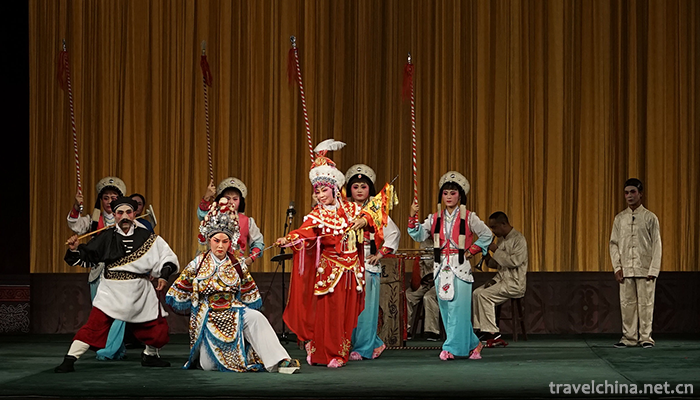
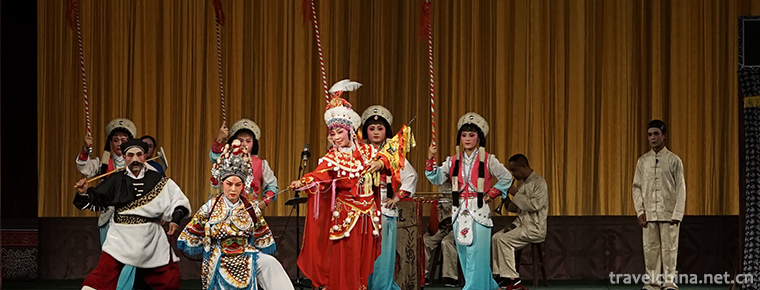
Siping Opera
-
Jinggangshan MountainMt Jinggang
Jinggangshan, National AAAAA Tourist Scenic Spot, National Key Scenic Spot, National Nature Reserve, Chinese Cultural Scenic Spot
Views: 216 Time 2018-12-08 -
Xingwen sea
Xingwenshihai is located in Xingwen County, Yibin City, Sichuan Province. It is located in the transition zone between Sichuan Basin and Yunnan-Guizhou Plateau. Its total area is about 156 square kilo
Views: 269 Time 2018-12-24 -
Guyi Garden
Guyi Garden is located in Nanxiang Town, Jiading District, northwest suburb of Shanghai. It was built in Jiajing period of Ming Dynasty. Its original name is "Yiyuan". It was taken from the
Views: 142 Time 2019-01-12 -
Mudan River Side Wall
The Mudanjiang Side Wall was built in the Tang Dynasty, presumably at the junction of Mudanjiang City in Heilongjiang Province and the northeast of Hailin County.
Views: 313 Time 2019-02-07 -
Sea cucumber with eight treasures
Babao sea cucumber is a traditional dish in Yichang City, Hubei Province. "Babao" means ham, hoof tendons, chicken, winter bamboo shoots, shrimp, mushrooms, lotus seeds and water chestnut; i
Views: 181 Time 2019-03-25 -
The Story of Duzhenwan
Duzhenwan stories cover myths and legends, life stories, ghosts, foxes, ghosts and other fields, including conspiracy, good and evil, kindness and hatred and other different types
Views: 181 Time 2019-04-28 -
Gold lacquer inlay decoration technique
Gold lacquer inlay decoration technology, Beijing local traditional handicraft, one of the national intangible cultural heritage.
Views: 274 Time 2019-05-07 -
Qiang sheepskin drum
Sheepskin drum dance, known as "Monasha", "Moldasha" or "Buzila" in Qiang language, is a kind of sacrificial dance performed by "Shibi" in legal activities, als
Views: 205 Time 2019-06-10 -
Wuzuquan
Wuzu Quan is one of the Nanquan in traditional Chinese boxing. It is said that Cai Yuming (from Quanzhou, Fujian Province, 1853-1910) synthesized Baihe Quan, Monkey Quan, Arhat Quan, Dazun Quan and Ta
Views: 165 Time 2019-06-29 -
Longtouguan
Longtouguan, a cultural relic protection unit in Sichuan Province. Located in Jiangyang West Road, Jiangyang District, Luzhou City, Sichuan Province. Originally an ancient pass, it was built in the Shu Han Dynasty to build a wall for the earth; it was rebuilt in the 11th year of Chongzhen in the Ming Dynasty and rebuilt in the second year of Tongzhi in the Qing Dynasty.
Views: 70 Time 2020-10-16 -
Zhaohua ancient city
Zhaohua ancient city is located in Zhaohua Town, Zhaohua District, Guangyuan City, Sichuan Province. After that, Zhaochang county was renamed as Yichang county. Located at the confluence of Bailong River, Jialing River and Qingjiang River, the Jialing River flows here with Wancheng water system and natural Taiji. It has the reputation of "the world's first landscape Taiji" natural wonder.
Views: 152 Time 2020-11-08 -
Neijiang folk culture
Bull lantern dance is popular in Yuexi. One dressed as a shepherd boy and two dressed as cattle with cow shaped props. In the sound of gongs and drums, the shepherd boy first said doggerel to the audience to express the festival's congratulations, and then
Views: 368 Time 2020-12-16

